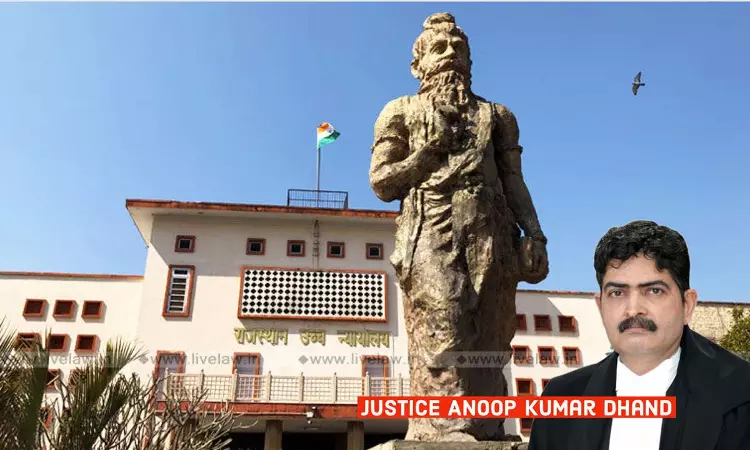- Home
- /
- High Courts
- /
- Rajasthan High Court
- /
- 'High Time To Set Up Administrative...
'High Time To Set Up Administrative Judicial Academy': Rajasthan High Court Sets Aside Revenue Court Order For Flouting Mandatory CPC Provisions
Nupur Agrawal
3 Jun 2025 11:31 AM IST
'High Time To Set Up Administrative Judicial Academy': Rajasthan High Court Sets Aside Revenue Court Order For Flouting Mandatory CPC Provisions
Rajasthan High Court held that the presiding officers in the Revenue Courts who were posted from the Administrative Services did not possess any legal background neither did they undergo any formal legal training. Hence, on many occasions, it was noticed that they commit procedural mistakes while deciding suits and appeals without following mandatory CPC provisions.“In India, the...
Rajasthan High Court held that the presiding officers in the Revenue Courts who were posted from the Administrative Services did not possess any legal background neither did they undergo any formal legal training. Hence, on many occasions, it was noticed that they commit procedural mistakes while deciding suits and appeals without following mandatory CPC provisions.
“In India, the increasing complexity of legal disputes, burgeoning caseloads and evolving dimensions of justice delivery have necessitated continuous judicial education. A robust, independent and efficient judiciary is indispensable to a functioning democracy… with increasing caseloads, the emergence of complex issues and fast-changing socio-economic landscape, the role of a Judicial Officer or a Presiding Officer has evolved far beyond traditional legal interpretation.”
The bench of Justice Anoop Kumar Dhand held that it was high and right time to establish an “Administrative Judicial Academy” for such officers of Administrative Services wherein they can be imparted both pre-service and in-service training. The Court held that this need was neglected for a long time by the Government of Rajasthan, leading to disastrous results.
The Court was hearing a petition filed against the orders of the trial court wherein the suit of partition and permanent injunction filed by the respondent was decreed by the trial court without framing issues or recording evidences. This order was further upheld by the first appellate court as well as the second appellate court.
After referring to the procedure delineated in CPC, and particularly highlighting Order 14, CPC, which laid down the procedure of settlement of issues and determination of suit on issues of law, the Court opined that the conduct of the Revenue Court as well as the Appellate Courts was quite shocking and surprising.
“Perusal of the provisions provided under Order 14 CPC clearly indicate that whenever pleadings are disputed by the either side, it is the bounden duty of the Court to frame issues for determination of the dispute based on the pleadings made by the parties to the suit and thereafter, the burden is required to be allocated on the party, whosoever is disputing the material fact or the provisions of law… It is quite shocking and surprising that in the instant case, neither the issues were framed nor the evidence of either side was recorded and straightway, the impugned order has been passed decreeing the suit filed by the plaintiff.”
The Court allowed the petition, set aside the impugned order, and remitted the matter back to the trial court for fresh disposal of the suit. It was stated that instant case of a classic and glaring textbook example of obstination exhibited by the Revenue Courts.
“The practical process is openly flouted by these Courts on account of lack of knowledge about the procedure laid down under the law. The Revenue Courts and the Appellate Revenue Courts are considered to be performing quasi-judicial functions as they handle matters that are not strictly judicial but require a degree of fairness and objectivity in decision making, much like the Judicial Courts do.”
The Court gave the example of newly appointed Judicial Offices who were required to undergo a one-year training at the State Judicial Academies and held that why the officers posted in the Revenue Courts and the appellate revenue courts should not be sent for such trainings.
In this background, the Court opined that the officers must be trained in farming issues, recording evidence, and drafting judgments at both the trial and appellate levels. They should be familiarized with various stages of a suit and the procedures. Ruling that it was expected from the Government to establish an Administrative Judicial Academy, and apprise their officers about the procedure to be followed in the Courts, the Court laid down following steps for the State:
- Establish an Administrative Judicial Academy to organize mandatory training program for newly appointed and in-service administrative officers.
- Conduct research on judicial reforms for management and access to justice.
- Promote judicial innovation, through seminars, colloquium, and workshops.
- Develop a comprehensive curriculum that blends theory with practical training of procedural laws.
- Sensitize the officers to expedite disposal of matters without granting unnecessary adjournments.
Ruling that such academy could emerge as a torch-bearer in the judicial education, playing a transformative role in the administration of justice delivery system, the Court directed the copy of the order to be sent to the State.
While scheduling the next date of hearing on September 1, 2025, the Court directed the State to apprise the Court regarding the steps to be taken in compliance with the directions.
Title: Umakant Sharma v Om Prakash Sharma

